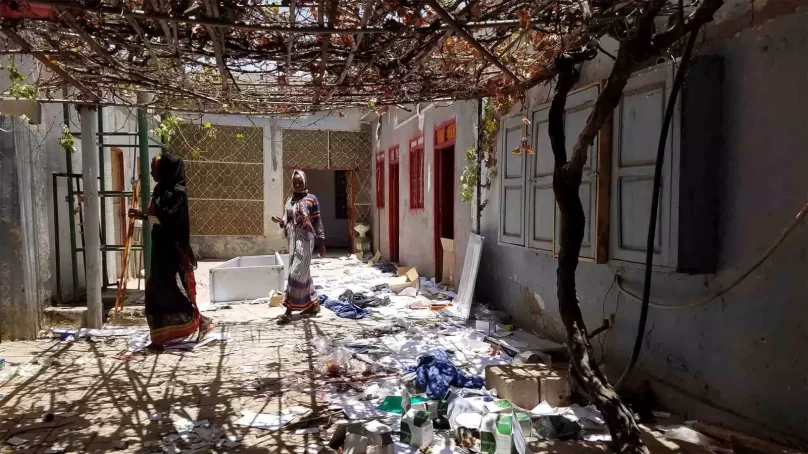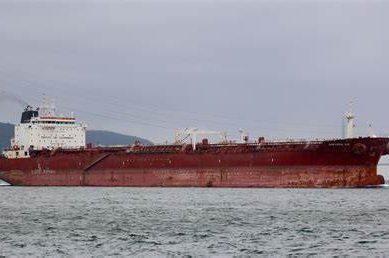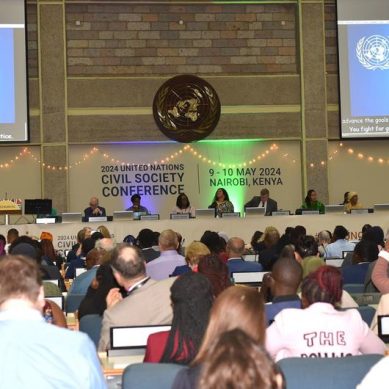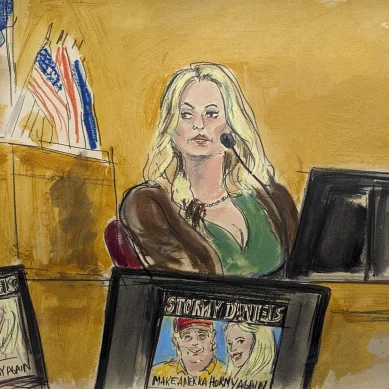
The dormitories of a school set up for orphans in Nyala were destroyed, as was a professional training centre that taught hard skills to a new generation of youth in the region.
A major medicine store that contained supplies used by people across Darfur was also looted. And a printer in the ministry of education building that created books for primary and secondary students across the region was taken too.
Some civilians began arming themselves to protect against the looting, although others sadly participated in the plunder. After the militias took items of value, civilians would pick apart the rest: furniture, tables, books, even the roofs of buildings.
Soon the stolen goods started appearing in illicit markets in RSF-controlled areas where weapons and drugs were also on sale. People called them “Colombia markets” because of the connection to illegal substances.
The militia presence forced merchants to withdraw their stock from shops and markets and store them in their padlocked homes. As a result, it has become harder and harder to find food in town, and the price of what is available has soared.
Food from Khartoum – our main source of supplies – has dried up as the fighting there has intensified. Traders are bringing in goods from neighbouring South Sudan and Libya, but bad roads and insecurity impact their efforts.
Members of my family have often been eating just a single meal per day – usually lunch. We have depended on the generosity of my brothers who have been sending us money from their base in Saudi Arabia.
Getting medicine has also become a challenge as prices soar. A doctor friend in Nyala told me last week that a young girl had her hands amputated because her family were unable to buy fresh bandages to keep her wounds clean.
The humanitarian situation is even worse for those living in the massive displacement camps on the outskirts of Nyala. These camps house victims of the early 2000s conflict. They are the unseen face of the current humanitarian crisis.
Many of the displaced are dependent on international humanitarian aid – which has been suspended in Darfur – and on daily work in Nyala, either at the market or in the houses and shops of townspeople.
Women and girls have been especially impacted by the conflict. According to my sources, some are being kept in warehouses and hotels by RSF and militia fighters who are sexually abusing them. I believe there may be several hundred cases.
As a journalist in a situation like this, receiving reams of information over WhatsApp, the most constructive thing I can do is use social media to raise awareness of what we are facing.
Others have been focusing their efforts on helping those in need. In my area, groups of people have been distributing soup, while neighbourhood-based activist groups set up civilian checkpoints to restrict the movement of the motorcycle gangs.
Local residents have also been supporting people uprooted within Nyala. They have received no help from international aid agencies, whose response efforts are focused on those fleeing Khartoum, more than 1,000 kilometres away.
Nyala’s displaced fled the most dangerous parts of the city and are currently sheltering in the dormitories of a local university and in schools. Every day, locals bring them supplies of water and food.
Community leaders at one of the camps set up in the early 2000s have, meanwhile, led a local initiative to track down looted medicine and return it to one of the main hospitals in Nyala. It is humbling to see people with high levels of need do such a thing.
A ceasefire committee was also set up at the beginning of the conflict to coordinate the efforts of community leaders and authorities that have sought to mediate between local army and RSF units and beg them to stop the war.
Similar committees have been set up in other parts of Darfur, underscoring the determination of residents to resist a conflict between two parties that very few civilians support.
At first, the ceasefire committee succeeded in Nyala, brokering a pause to the conflict around Eid al-Fitr, which marks the end of Ramadan. But after Eid passed, the war continued.
Right now, it is hard to see the light at the end of the tunnel. The RSF has control over almost all of Nyala, and much of the rest of Darfur, although the army is still entrenched in a few bases and clashes are frequent.
Some people seem to think that the RSF’s leader, Mohamed Hamdan Dagalo ‘Hemedti’, will build back Darfur and make it more developed. I tell them that a militia that destroys libraries, schools, and hospitals is not going to bring democracy.
What we need most urgently is humanitarian assistance. International aid groups say Darfur is too insecure to operate in, but I have followed wars in other countries like Ukraine where they work in even tougher circumstances. Why can’t they do that here?
International actors also need to recognise that peace requires justice. This crisis won’t end with military men having talks and signing pieces of paper. Ending the gunfire won’t bring our relatives back. We need reparations and an end to impunity.
Finally, we need to keep using our voices as Darfurians. The men with guns are speaking louder than us right now, but we have the power to speak up too, to let the world know what is really happening.
I often feel like I am part of an unlucky generation in Darfur. For 37 years, I have witnessed people dying and perpetrators enjoying their lives. Not for the first time, I have had to leave the region for safety abroad.
But we cannot allow this to be the case for the next generation of Darfurians, let alone this one. That is why I will spend the rest of my days fighting for justice and peace. I will never give up.
- The New Humanitarian report / By Ahmed Gouja, journalist and rights monitor based in Nyala, Darfur











